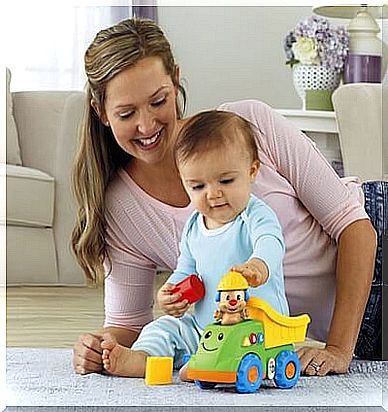Acute Mommy, The Baby Just Wants To Be With Mommy my

Is it always a drama when you can’t be together with your little one? If you are going through a situation like this, your baby is at the stage of acute mommyitis.
Do you know what this is?
What is acute mommyitis?
We can say that a child has acute mommyitis when he has developed his physical autonomy enough to be able to move around on his own, but even so he looks for mommy for everything and can’t bear to be separated from her.
Even when you can be with other people with whom you also have a trusting relationship.
Of course, a baby is not self-sufficient. So you need the protection of your parents, especially in the first few months.
The mother is your world, your attachment figure. But as he grows up and acquires new skills, he needs less help and becomes more independent.

When does acute mommyitis appear?
The main peak of acute mommyitis appears between approximately 10 and 18 months.
At this stage, children begin to become more aware of themselves and more autonomous.
This means that they can walk, run and move around. Their main objective is to explore the world around them, always accompanied by Mom.
The next stage takes place a little later, specifically between the ages of two and three.
Babies relate as much to the world around them as to the people who live in it.
All of this involves meeting a lot of new people. In these situations, they feel more comfortable if Mom is around to give them a sense of security.
And, finally, a third stage of acute mommyitis can occur around the age of four or five. Time when children want to do everything with their mother, go to the supermarket, cook….
At this stage, there is a kind of “passion” for the mother, which in psychoanalytic theory receives its own name.
In addition to these phases of acute mommyitis that all children go through, there are times when there can be relapses.
That is, a phase of acute mommyitis that is nothing more than a moment of insecurity for children who cling to mommy in an attempt to regain stability.
There are many reasons that can trigger these situations of excessive attachment.
Thus, it may be due to the evolutionary moment the child is going through or other external reasons, such as an illness or jealousy over the arrival of a little brother, for example.
The good news is that these moments are often fleeting and easy to resolve.
What can we do to cure acute mommyitis?
The solution is very simple: patience and a lot of common sense. We should help our child to regain confidence in himself and try to make him able to be with other people.
It is also very important that our little ones learn to be with only daddy or grandparents.
At first, let’s try to make her spend pleasant moments, that is, she does things like playing or reading stories so that, after a few days, she will be able to carry out routine tasks without Mom around.
The best way to give our child independence, at such a young age, is through play.
We can start by playing with our child, with building blocks, colored marbles, puzzles or something that entertains them.
That way, when he’s entertained, we can get up and walk away a little, a meter or so, while still talking to him so he’ll realize we’re close.
It’s simply a matter of time, affection and a lot of patience.

What we should never do…
In this evolutionary phase of our son, the dad also suffers a lot. It’s hard to deal with the fact that the little one wants to be with only his mother and doesn’t want to do anything with him.
We must keep in mind that, at this age, the child is not aware that refusing to be with Daddy can make him suffer.
That is, she still doesn’t have the ability to empathize, to put herself in the other’s shoes. It just seems easier with Mom.
Also, we should avoid making the mistake of thinking that our child consciously rejects other people when going through one of these phases.
Therefore, we must be understanding and make other family members, grandparents and uncles, for example, understand that the child may feel or say inconvenient phrases that do not help in this situation.
Finally, what we must always keep in mind is that establishing a strong and comfortable emotional bond between the child and the mother favors adequate development for the rest of life.









